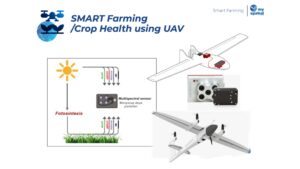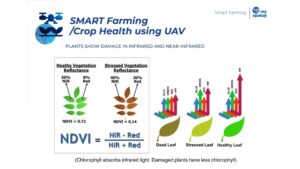In recent years, the agricultural industry has witnessed a transformative shift in the way crop health is monitored and managed. Traditional methods of crop monitoring, such as ground-based surveys and satellite imagery, are being supplemented and in some cases replaced by the use of Unmanned Aerial Vehicles (UAVs), also known as drones. In this blog, we’ll explore how UAVs are revolutionizing crop health monitoring, providing farmers with unprecedented insights and opportunities to optimize yields and sustainability.
1. Enhanced Precision and Efficiency:
UAVs equipped with advanced imaging sensors, such as multispectral and thermal cameras, offer a level of precision and detail that surpasses traditional methods. These sensors capture high-resolution imagery of crops and provide valuable data on factors such as chlorophyll content, moisture levels, and temperature variations. By flying at low altitudes and capturing data with high spatial and temporal resolution, UAVs enable farmers to monitor crops with unparalleled accuracy and efficiency.
2. Early Detection of Stress and Disease:
One of the key advantages of UAV-based crop monitoring is the ability to detect signs of stress, disease, and pest infestations at an early stage. By analyzing multispectral imagery and utilizing advanced algorithms, farmers can identify subtle changes in crop health that may not be visible to the naked eye. Early detection allows for timely intervention, enabling farmers to mitigate the spread of disease, minimize yield losses, and optimize resource allocation.
3. Precision Farming Practices:
UAVs play a crucial role in enabling precision farming practices, such as variable rate application of inputs (e.g., fertilizers, pesticides, water). By generating detailed maps of crop health and variability within fields, UAVs provide farmers with actionable insights to tailor inputs according to specific crop requirements and environmental conditions. This targeted approach not only maximizes resource efficiency but also minimizes environmental impacts and improves overall sustainability.
4. Data-Driven Decision Making:
The wealth of data generated by UAV-based crop monitoring facilitates data-driven decision making for farmers. Through the use of analytics software and Geographic Information Systems (GIS), farmers can analyze and visualize crop health data in real-time, identify trends and patterns, and make informed decisions about crop management strategies. Whether it’s optimizing irrigation schedules, adjusting planting densities, or implementing pest control measures, UAV-derived data empowers farmers to make decisions that optimize yield and profitability.
5. Future Perspectives and Challenges:
As technology continues to evolve, the potential applications of UAVs in crop health monitoring are limitless. From the integration of artificial intelligence and machine learning algorithms for automated data analysis to the development of advanced sensor technologies for even greater precision, the future of UAV-based crop monitoring holds great promise. However, challenges such as regulatory constraints, data privacy concerns, and the need for skilled operators remain important considerations for widespread adoption and implementation.
UAVs are revolutionizing crop health monitoring, providing farmers with unprecedented insights and opportunities to optimize yields, minimize risks, and enhance sustainability. By harnessing the power of UAV technology, farmers can make more informed decisions, increase productivity, and contribute to a more resilient and sustainable agricultural future.
In conclusion, the integration of UAVs into crop health monitoring represents a paradigm shift in agricultural practices, offering farmers new tools and techniques to meet the challenges of feeding a growing global population while preserving the health of our planet. As UAV technology continues to advance and become more accessible, the potential for innovation and impact in agriculture is truly limitless.
Ready to revolutionizing your crop health monitoring? Contact MySpatial today; +60133565626 or [email protected] today to learn more about crop health monitoring and how it can benefit your business. Let’s embark on a journey of innovation and exploration together!


